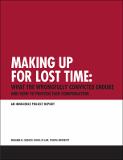| dc.description.abstract |
It’s an accepted principle of fairness in our society to compensate citizens who, through no fault of their own, have suffered losses. When a person’s land has been seized for public use, they receive adequate repayment. Crime victims and their families receive financial compensation in all 50 states. Yet, strangely, the wrongfully imprisoned, who lose property, jobs, freedom, reputation, family, friends and more do not receive compensation in 23 states of the nation… This report details the specific obstacles that exonerees face, the lack of support they currently receive, and how compensation statutes in many states have not done justice to the wrongfully convicted. It also presents solutions to these shortcomings and gives examples of how exonerees have used state compensation to find housing and meet other urgent needs, nurture talents, find success, and get their bearings in the free world. (palabras claves: condenas erróneas, exoneración, inocencia, identificación ocular, reconocimiento de imputados, ADN) |

